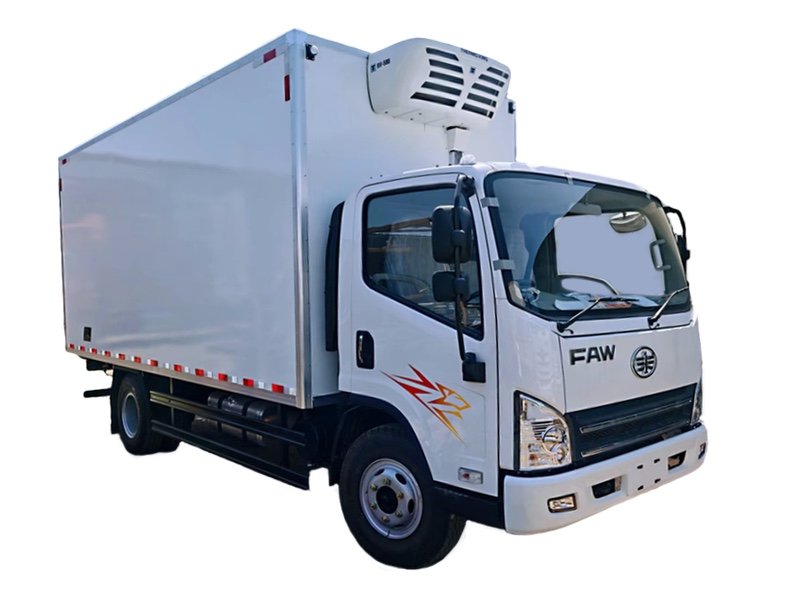Refrigerated Transportation Thermo King: Maintaining Product Fresh in Transit
Refrigerated Transportation Thermo King: Maintaining Product Fresh in Transit
Blog Article
Top Developments in Transport Refrigeration: Enhancing Performance and Safety And Security
The landscape of transportation refrigeration is going through substantial makeover, driven by innovations targeted at improving both performance and safety. Secret improvements such as wise temperature surveillance systems, environment-friendly cooling agents, and automated route optimization are pivotal in addressing the sector's obstacles. These innovations not only guarantee the integrity of temperature-sensitive products but also add to sustainability initiatives. As these technologies continue to advance, it is necessary to explore their implications on operational methods and regulatory conformity, motivating a more detailed examination of just how they improve the future of transportation refrigeration.
Smart Temperature Monitoring Systems
In the realm of transport refrigeration, wise temperature monitoring systems have actually become a crucial technology for ensuring the stability of temperature-sensitive products. These innovative systems utilize Net of Things (IoT) innovation to supply real-time data on temperature changes, allowing drivers to keep optimum problems throughout the supply chain. By continually tracking the temperature of refrigerated containers and cars, business can quickly determine variances that might jeopardize product high quality.

Moreover, smart surveillance systems typically incorporate automated informs and notifications, enabling stakeholders to respond without delay to any type of prospective issues. This positive approach not just decreases the danger of putridity yet likewise boosts compliance with regulatory standards regulating food safety and pharmaceutical transport.
The combination of information analytics within these systems also helps with anticipating upkeep, helping operators to anticipate possible tools failures before they happen. This ability lowers downtime and optimizes operational effectiveness, inevitably leading to set you back savings.
Eco-Friendly Refrigerants
Smart temperature level monitoring systems play an essential function in keeping product high quality, but the efficiency of transport refrigeration also hinges on the option of cooling agents made use of. In contrast, emerging options like hydrocarbon-based cooling agents and hydrofluoroolefins (HFOs) existing lower GWP options, supplying both efficiency and sustainability.
These green refrigerants not only lessen environmental influence however additionally straighten with international regulations targeted at phasing out dangerous materials. Their fostering can lead to enhanced energy efficiency, ultimately decreasing operating expenses for transportation refrigeration systems. Moreover, making use of all-natural cooling agents, such as ammonia and co2, has gotten grip because of their excellent thermodynamic properties and lower environmental footprint.
Buying green cooling agents is not simply a regulative compliance action; it stands for a tactical decision that boosts brand credibility and fosters consumer loyalty. thermo king truck refrigeration units. By prioritizing lasting methods, firms can add to a greener future while guaranteeing the stability of transferred items
Advanced Insulation Products
Using advanced insulation products is vital for optimizing transportation refrigeration systems, as they dramatically improve power effectiveness and preserve consistent temperature level control. Conventional insulation methods usually drop short in preventing thermal transfer, resulting in increased power intake and varying temperatures within chilled compartments.
Arising materials such as vacuum cleaner insulated panels (VIPs) and aerogels use remarkable thermal resistance, enabling for thinner profiles without endangering efficiency. VIPs, as an example, use a vacuum cleaner layer to minimize convective and conductive warmth transfer, making them perfect for space-constrained applications. Aerogels, recognized for their permeable and light-weight structure, offer exceptional insulation while considerably lowering overall system weight.
Furthermore, integrating stage adjustment products (PCMs) into insulation systems can even more support temperature levels throughout transportation. These products absorb and release thermal power, effectively buffering against exterior temperature variations.
The combination of these innovative insulation products not just lowers the functional prices associated with energy consumption but also extends the service life of temperature-sensitive goods. As the transport refrigeration industry continues to evolve, the adoption of innovative insulation innovations will certainly be essential in improving both effectiveness and security in cooled transport.
Automated Route Optimization
The efficiency of transport refrigeration systems is significantly enhanced through automated route optimization, which leverages advanced algorithms and real-time information to establish one of the most reliable courses for shipment. By examining different variables such as website traffic patterns, climate condition, and shipment windows, these systems can considerably reduce traveling time and gas consumption.
Automated route optimization decreases human error and subjective decision-making, which can lead to inadequacies. This modern technology their website allows fleet managers to allot sources much more effectively, making certain that cooled goods keep their required temperature level throughout the journey. By optimizing paths, companies can additionally improve consumer satisfaction via timely distributions.
Additionally, automated systems can adjust to unanticipated situations, such as roadway closures or sudden traffic spikes, permitting dynamic rerouting. This versatility not only protects the integrity of temperature-sensitive products however likewise contributes to total operational her response effectiveness.
Implementing automated path optimization can cause considerable price savings while minimizing the carbon impact related to transport. As businesses progressively focus on sustainability, this innovation attracts attention as an important part in modern transport refrigeration, lining up functional objectives with environmental obligation. Eventually, automated course optimization represents a considerable innovation in the quest for effectiveness and security in transportation refrigeration.

Real-Time Data Analytics
Automated route optimization significantly take advantage of the combination of real-time data analytics, which provides essential understandings into the efficiency of transportation refrigeration systems. By utilizing real-time data, transport drivers can keep track of temperature variations and equipment efficiency, making sure that perishable items are maintained within called for specifications throughout transportation. This positive strategy not only boosts the high quality of the transferred items but likewise mitigates the threat of spoilage and loss.

In enhancement to enhancing efficiency, real-time analytics enhances security by guaranteeing compliance with governing requirements for temperature control. This not just secures public health but additionally fortifies a firm's online reputation - reefer trucks thermo king. As the transportation refrigeration market evolves, the assimilation content of real-time data analytics becomes a foundation for driving advancement, sustainability, and operational quality
Final Thought
Finally, the innovations in transport refrigeration significantly boost both efficiency and safety and security within the sector. Smart temperature surveillance systems and real-time data analytics provide essential oversight, while environment-friendly cooling agents and advanced insulation materials contribute to sustainability and energy performance. Automated path optimization formulas not just decrease traveling time yet likewise decrease environmental influence. Collectively, these innovations represent a vital advancement in transport refrigeration, making certain conformity with governing standards and advertising a greener future.
The landscape of transportation refrigeration is undertaking significant change, driven by advancements intended at improving both effectiveness and security.Smart temperature level tracking systems play a crucial function in preserving product high quality, but the effectiveness of transport refrigeration also pivots on the choice of cooling agents made use of. Their fostering can lead to boosted power effectiveness, eventually lowering operating prices for transportation refrigeration systems. Inevitably, automated course optimization stands for a considerable improvement in the mission for effectiveness and security in transportation refrigeration.
In verdict, the innovations in transportation refrigeration significantly enhance both performance and safety and security within the market.
Report this page